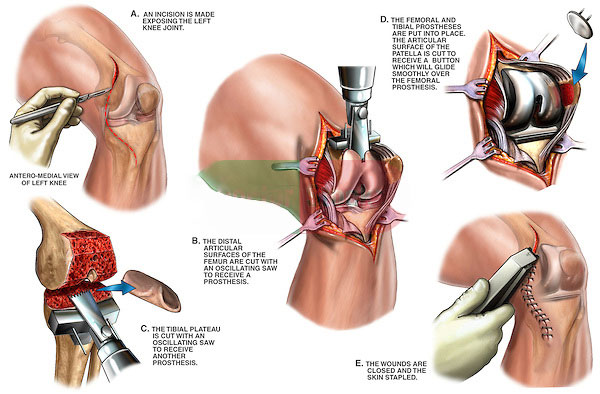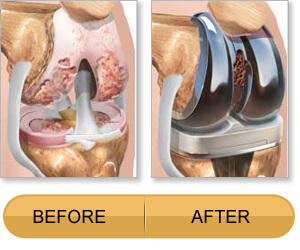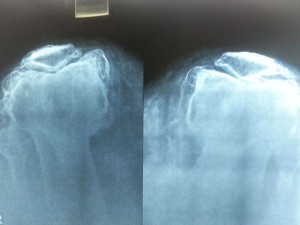With
knee replacement in Delhi, the ends from the damaged thigh and lower leg (shin) bone fragments and usually the cap are capped with artificial surfaces. These types of surfaces are layered with metal and plastic. In most cases,
orthopaedic in Delhi replace the entire surface area at the ends in the thigh and leg bones. Doctors generally secure knee joint components to the bone tissues with cement.
Orthopaedic in South Delhi are working on methods to replace just the broken parts of the leg joint. This is occasionally called partial joint replacement. Non-compartmental alternative is one example of partial knee replacement. This replaces just the internal knee surfaces as well as outer knee areas, depending on where the harm is. Another just a few replacement is called your patellofemoral replacement. With this surgery, the end on the thigh bone is usually replaced, and a great artificial surface is utilized to line your back of the kneecap.
On knee replacement operation,
orthopaedic in Dwarka remove the ruined cartilage and replace it with new joint surfaces in the process.
Joint adjustments caused by osteoarthritis could also stretch and harm the ligaments the fact that connect the upper leg bone to the leg bone. After surgical treatment, the artificial joint itself and the staying ligaments around the joint usually provide ample stability so that the destroyed ligaments are not problems.
Your
orthopaedic in Janakpuri may use basic anesthesia. This means you’ll certainly be asleep during the surgical procedure. But sometimes health professionals use regional inconsiderateness. This means you can’t find out the area of the surgery. You are going to feel sleepy, however, you will be awake. Which kind of anesthesia you get depends on your physician and on your overall health. Your physician might also ask whatever you prefer.
Your
orthopaedic in Uttam Nagar might recommend that you consider antibiotics before and after the surgery to reduce the chance of infection. If you need any kind of major dental work, your medical professional may recommend that you could have it done prior to the surgery. Infections may spread from other areas of the body, such as the mouth, towards the artificial joint and cause a serious problem.
What you should expect After Surgery
Immediately after surgery
You will have 4 antibiotics for approximately a day after surgical procedures. You will also receive medications to control pain, and maybe medicines to prevent bloodstream clots. It is not uncommon to have an upset belly or feel constipated after surgery. Talk to your
orthopaedic in RK Puram or health professional if you don’t feel very well.
When you wake up coming from surgery, you will have a plaster on your knee. You will likely have a drain to collect fluid and maintain it from accumulating around your joint. You may have a catheter. This is a small pipe connected to your bladder so you don’t have to get free from bed to pee. You may also have a good compression pump or perhaps compression stocking in your leg. This device pushes your leg. That keeps the blood moving and helps prevent body clots.
Your
orthopaedic in Malviya Nagar may possibly teach you to do basic breathing exercises to assist prevent congestion within your lungs while your company’s activity level is definitely reduced. You may also learn how to move your feet up and down to bend your muscles and keep your body’s blood circulating.
The initial few days
You will probably nonetheless take some medication. Over time, you will have less and less pain remedies. You may keep acquiring medicines to prevent blood vessels clots for at least 15 days after medical procedures.
Most people who have
knee replacement in Delhi begin to walk with a master or crutches your day of surgery or maybe the next day. And most persons can bear excess weight on the knee when it is comfortable.
A physiotherapist will help you gently flex and straighten your knee. Your
orthopaedic in Green Park will also begin a few simple exercises to aid strengthen your leg muscles.
Treatment (rehab) after a leg replacement is rigorous. The main goal of rehab is to enable you to bend your kneecap at least 80 degrees. That much flex is enough for you to do day to day activities, such as walk, rise stairs, sit with and get up via chairs, and enter and out of the car. Most people can easily bend the leg more than 90 levels after surgery. However one of the things that impacts how much bend you get after medical procedures is how much curve you had before surgery treatment. To get the most take advantage of your surgery, it is crucial that you take part in therapy. You will get this remedy both while you are inside the hospital and after you decide to go home.
Most people return home within a few days into a week after operation. Some people who need much more extensive rehab or maybe those who don’t have somebody who can help at home visit a specialized rehab center for more treatment.
Continuing recovery
After you go back home, watch the surgical treatment site and your health and wellness. If you notice any inflammation or drainage from the wound, tell your
orthopaedic in Saket. You may also be recommended to take your temperatures twice each day and also to let your surgeon understand if you have a fever over 38°C (100. 4°F).
Rehab proceeds after you go home through the hospital. You will get rehabilitation until you are able to function on your own and you return as much strength and range of motion in your knees as you can. You will maintain working on increasing the total amount you can bend your company’s knee and on setting up strength and stamina. Total rehab following surgery will take a few months.
You will have an exercise system to follow when you go house, even if you are still having physiotherapy. You should also have a short walk many times each day. If you notice virtually any soreness, try a chilly pack on your kneecap. You might also cut back on your activity a bit. Yet don’t stop totally. Staying on your going for walks and exercise program can help you recover faster.
Your
orthopaedic in Delhi may recommend that you ride a fixed bike. It can help enhance your leg muscles and make your knee bending. Going swimming is also a good workout after knee surgical procedure. But don’t will end up in the water until your stitches are removed.
Coping with a knee alternative
Determining your weight will help your brand-new knee joint keep going longer.
Stay active to keep your strength, versatility, and endurance. Your body’s activities might consist of walking, swimming (after your wound is totally healed), dancing, as well as golf. (If you golf, don’t put on shoes with surges. And make sure to use a golfing cart.) You can also try cycling on the stationary bike or simply on level floors.
For at least 2 years soon after your surgery, your
orthopaedic in South Delhi may want you to take on antibiotics before oral alignment or any invasive surgical procedure. This is to help stop infection around your knee replacement. Following 2 years, your doctor and dentist will determine whether you still require antibiotics. Your general health insurance and the state of your additional health conditions will help all of them decide.
Why It really is Done
Doctors may not advise knee replacement for individuals who:
- Have poor overall health and may not endure anesthesia and medical procedures well.
- Have an energetic infection or are in danger for infection.
- Possess osteoporosis (significant loss of the bones).
- Have got severe weakness with the quadriceps muscles in front of the thigh.
Get a knee the fact that appears to bend backwards when the knee can be fully extended (genu recurvatum), if this problem is due to muscle a weakness or paralysis.
Will be severely overweight. Alternative joints may be very likely to fail in people who also are very overweight.
A few doctors will propose other types of surgery if at all possible for younger persons and especially for those who carry out strenuous work. Your younger or more productive person is more likely than an older or much less active person to have artificial knee joint wear out. People who are extremely overweight are also very likely to have an artificial leg joint wear out from your extra stress within the joint.
Doctors commonly don’t recommend knees replacement surgery for those who have very high anticipations for how much they’ll be able to do with all the artificial joint. (Examples are people who be prepared to be able to run, skiing, or do alternative activities that stress the knee joint. ) The artificial kneecap allows a person to perform ordinary daily activities with less pain. Will not restore the same degree of function that the man had before the harm to the knee joint began.
How Very well It Works
Most people possess much less pain immediately after
knee replacement in Dwarka and are able to accomplish many of their activities more easily.
The leg will not bend as much as it did prior to you developed knee complications. But the surgery will help you to stand and walk for longer intervals without pain.
After operation, you may be allowed to continue activities such as golf, riding a bike, swimming, strolling for exercise, dance, or cross-country snowboarding (if you do these activities prior to surgery).
Your doctor may well discourage you by running, playing rugby, squatting, and performing other things that place a lot of stress around the joint.
The younger that you are when you have the surgical treatment and the more tension you put on the joint, the more likely it is you will later need a second surgery to replace the first artificial joint. Over time, the components wear out or may release and need to be changed.
Your artificial joint should last longer if not overweight and you usually do not do hard physical work or perform sports that anxiety the joint. In case you are older than 60 if you have surgical procedure, of
joint replacement in Delhi, the artificial joint will probably last the remainder of your life.
People who have some partial knee alternative may have less problems. But in one study these were not as satisfied because people who had a complete knee replacement.
If you wait around to have surgery till you have already dropped a lot of your power, flexibility, balance, strength, and ability to become active, then just after surgery you might have your harder time for your normal actions.
Risks
Risks out of knee replacement surgical procedures include:
Blood clots. People may get a good blood clot within a leg vein once knee joint substitute surgery. Blood clots can be dangerous in the event that they block blood circulation from the leg returning to the heart and also move to the lung area. Blood clots happen more often in seniors, people who are very obese, people who have had blood stream clots before, and those that have cancer.
Contamination in the surgical injury or in the joint. Infection is uncommon in people who will be otherwise healthy. Many people are at higher risk of infection after any sort of surgery. This includes individuals who have other health problems, including diabetes, rheumatoid arthritis, or perhaps chronic liver disease, and those who take corticosteroids. Many wound infections are actually treated with anti-biotics. Infections deep from the joint may need much more surgery. And in some cases a doctor must remove the unnatural joint.
Nerve damage. In rare cases, some nerve may be hurt around the site of your surgery. It is more prevalent (but still unusual) if the surgeon is additionally correcting problems inside joint. A neural injury may cause tingling, numbness, or problems moving a muscle mass. These injuries often get better over time and perhaps may go away entirely.
Problems with wound recovery. Wound healing trouble is more common in people who also take corticosteroids or maybe who have diseases the fact that affect the immune system, just like rheumatoid arthritis and diabetes.
Lack of good mobility. How much you can fold your knee following surgery depends a whole lot on how much you might bend your knees before surgery. Some individuals are not able to bend their particular knee far plenty of to allow them to do their very own regular daily activities, actually after several weeks of recovery. If this happens, your physician may give you your medicine to relax the muscles and then gently pressure your knee to bend further. This might loosen tissues throughout the joint that are stopping you from twisting it.
Dislocation belonging to the kneecap (patella). This really is an uncommon problem of knee replacing surgery. If this happens, the kneecap may proceed to one side within the knee, and it will “pop” back when you bend over your knee. It’s not always painful, but it could make the knee experience unstable, and it might be uncomfortable. Dislocation from the kneecap interferes with the way in which your thigh muscle tissue (quadriceps) work, and it usually must be treated with medical procedures. In some cases, the kneecap replacement surgery should be completely redone in the event the dislocation is the effect of a problem with the way the elements in the knee get in line.
Fracture of the cap (patella). The cap could fracture possibly because of a fall as well as while you are using the leg normally. This problem is very uncommon. It might be seen in people who can certainly bend the knees almost normally and may easily climb stairways and get up right from chairs. Doctors in most cases can treat a good fractured kneecap with no surgery.
Instability during the joint. The kneecap may be unstable or simply wobbly if the substitution components are not correctly aligned. You may need a second surgery to align the constituents correctly so that your leg is stable.
The typical risks of standard anesthesia. Risks of any surgery happen to be higher in people that have had a recent myocardial infarction and those who have long lasting (chronic) lung, liver organ, kidney, or heart problems.
What To Think About
Workout (swimming, walking) is very important to your general wellbeing and muscle energy. Talk with your doctor which kind of exercise is best for you.
Occasionally you may donate your company’s own blood to work with during surgery in the event needed. This is known as autologous blood gift. If you choose to do this, begin the donation a few weeks before the surgery. You should have more time to contribute enough blood and rebuild your circulation volume before surgery treatment.
If you need more than one surgery for
joint replacement in Dwarka, which include both knees or possibly a knee and some hip, talk to your health care provider about guidelines that will help you and your doctor make a decision in which order to the actual surgeries









